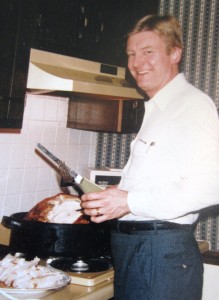The morning after Thanksgiving, while unloading the dishwasher, I noticed that nearly every piece of flatware we owned had been used the day before. The silverware basket was bulging with its load and represented about 10 pounds of knives, forks, and spoons nestled together in close quarters. But when I slid them out of the basket, each piece was sparkling clean.
 Since one of my sister’s 30-somethings and one of mine had signed on for Thanksgiving “clean-up”, they had done all the dishes the night before. And as I looked at that pile of sparkling knives, forks, and spoons, it was a marvel the dishwasher had transformed them so easily and thoroughly. The last time I’d seen them, they’d been gunked up with bits of turkey, greasy stuffing, and mashed potatoes. And they were unfit to use again until each had been dealt with “personally” by being cleaned. That included being stuffed into the dishwasher basket, followed by contact with soap, water, and heat.
Since one of my sister’s 30-somethings and one of mine had signed on for Thanksgiving “clean-up”, they had done all the dishes the night before. And as I looked at that pile of sparkling knives, forks, and spoons, it was a marvel the dishwasher had transformed them so easily and thoroughly. The last time I’d seen them, they’d been gunked up with bits of turkey, greasy stuffing, and mashed potatoes. And they were unfit to use again until each had been dealt with “personally” by being cleaned. That included being stuffed into the dishwasher basket, followed by contact with soap, water, and heat.
The same is true of our inner selves. Each of us is continually fighting against smudges on us that are rightfully called sins. If we accumulate too many of them at once, we become unfit for God’s use, much like the dirty silverware. Every sin has to be dealt with personally, one at a time, and if we ignore them and let them pile onto us, the purposes God originally planned for us cannot be achieved.
Just like there are specific purposes for clean knives, forks, and spoons, each of us has a purpose, too, something God intended from the beginning. And within us he has established the abilities and talents we need to get his intended plans accomplished. Not only that, he made us so that we’d experience rich satisfaction in carrying out the very things he had in mind for us to do.
But just like dirty silverware has no purpose until it’s been cleaned, we, too, have to be clean to be used.
 Thankfully there’s a way to get that done, and it’s linked to Jesus Christ. If we maintain a tender conscience toward our own sins, labeling them for what they are, he invites us to come to him for cleansing and promises to do it. Just like that dirty silverware, we can get sparkling clean again, becoming fit for his use because of his willingness to forgive us.
Thankfully there’s a way to get that done, and it’s linked to Jesus Christ. If we maintain a tender conscience toward our own sins, labeling them for what they are, he invites us to come to him for cleansing and promises to do it. Just like that dirty silverware, we can get sparkling clean again, becoming fit for his use because of his willingness to forgive us.
This Thanksgiving we decided to go casual, which is why I used my stainless steel flatware. I do own some sterling, but it seemed out of place with the rest of our décor. Maybe there is a place for the far more valuable sterling, though; once we’ve sought forgiveness and received clean-again status from the Lord, he views us as having the same sterling character as his Son. And that, he can use.
“We are God’s handiwork, created in Christ Jesus to do good works, which God prepared in advance for us to do.” (Ephesians 2:10)





